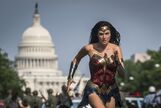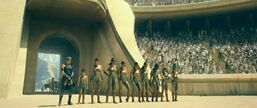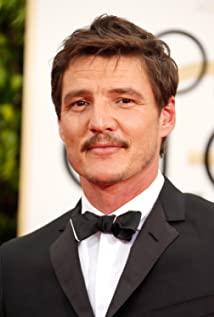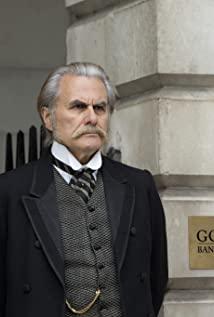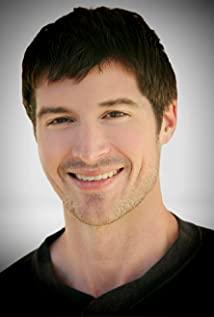This film also does not have time to make everyone realize gradually. In form, it can only rely on the female hero's speech to make everyone voluntarily give up their evil desires. But here's an easily overlooked design: Diana reaches everyone by touching the particles with the mantra lasso. This is the best design of the film in my opinion, and the function of the mantra lasso has been added to let people see the corresponding picture. My understanding is that, following the cognition of human beings in the first ending, Diana admitted that human nature is complex, with both good and evil, everyone is shaped by their experiences, and good experiences will remind them to present a good face, So instead of persuading them to be the person they have never been, a more reasonable way to guide them is to let them remind and inspire themselves to be the good person they are.
If you are looking forward to refreshing fights, novel visual effects, what special performance does the Golden Eagle Armor have, and how shocking the final battle is... Then you are likely to scold like RM who watched the movie with me: "This movie is a Rubbish!"
Aside from the above, what I'm looking forward to is how the film's story will respond to my curiosity: what dystopian implications does 1984 have? The result is that it feels pretty good.
I didn't like the first one very much, because when Ares, the god of war, revealed that he is the god of truth and that warlikeness is human nature, I was very curious about how Diana led everyone to achieve victory and transcendence in ideas, but the film did not show How the human beings in the war were guided and released their goodwill, but the heroine suddenly awakened a new lightning skill, and then Ares became angry with THEN I WILL DESTROY YOU! Then to the waves! Boom! Snapped! A pilgrimage of soldiers and soldiers, the end of spreading flowers... The abrupt theme is dwarfed.
The helplessness here is: the change of concept and the cost of habitual cultivation is a long process, and it cannot be done without unforgettable. However, due to the length of time, the film has never been able to complete the task of "characters complete evolution in a short period of time after being impacted at the ideological level" in one scene, especially when the main body of ideological evolution is all people. In this way, we have to rely on epiphany, as the sixth patriarch Huineng advocated! Therefore, there will be a feeling of mechanical serenity in the presentation of the story. Typically, in Thor, the arrogant Thor learned overnight the humility he had learned over the years as Doctor Blake in the comics.
The theme of this film is related to this helplessness - Diana's childhood win by taking shortcuts reflects the common greed of human beings: the creation of taking time, hoping that individual desires can be realized immediately. And ignoring time/process/cost is ignoring reality. So the dystopian nature of 1984 became apparent in the sense that the Soviet Union was at its peak, and the repressive atmosphere of the Cold War made everyone’s inner desires more restless than ever. The tour of cultural elements in the 1980s presented in the first half of the film is not only a display of individual creativity, but also a demonstration of individual differentiation. Differences constitute contradictions, contradictions lead to confrontations, and confrontations lead to disasters. The saturated satisfaction of individual desires leads to the irreconcilable intensification of conflicts within the collective and the final annihilation. In "Fake Gods", the male protagonist played by Jim Carrey thought that a peaceful and prosperous world could be achieved by fulfilling everyone's wishes, but what he saw was a full-scale behavioral sinking and self-destruction. (This film must have some reference to "Fake God", and even the design of separating the traffic flow like the Red Sea is exactly the same)
To deal with this kind of contradiction, the film also does not have time to make everyone gradually realize. In form, it can only rely on the speech of the heroine to make everyone voluntarily give up their evil desires. Therefore, it is criticized as "winning the war by mouth cannons". But here's an easily overlooked design: Diana reaches everyone by touching the particles with the mantra lasso. This is the best design of the film in my opinion, and the function of the mantra lasso has been added to let people see the corresponding picture. My understanding is that, following the cognition of human beings in the first ending, Diana admitted that human nature is complex, with both good and evil, everyone is shaped by their experiences, and good experiences will remind them to present a good face, So instead of persuading them to be the person they have never been, a more reasonable way to guide them is to let them remind and inspire themselves to be the good person they are. Just as the villain wants to conquer the world, he wants his son to be safe and proud of himself. So Diana allowed everyone to see who they were, and finally brought the villains and everyone back to peace. In my opinion, this way of handling makes up for the lack of the first part, and to a certain extent makes people's sudden change of opinion convincing.
It's just that the way of expression in this paragraph can be more direct and specific. In addition to showing the montage of the villain's growth and the Irish customer's regret for the cursed waiter and the fear of being taken away by the police, the rest of the passers-by are staring at the screen. The holy light may make it difficult for the audience to empathize. Under the premise of PG-13, the film can't follow the logic of reality. After all, people's wishes can be so bad... The picture is too beautiful and I dare not watch it. Therefore, on the screen, we can only select the situation that is very bad but still watchable to present. The so-called "apocalyptic feeling" relies more on music to render and contrast, so it must not be able to show a more realistic intensity. But this does not constitute a reason for criticism.
In addition, the leading actors of the film all contributed qualified performances, and Gadot and Pine once again added a quiet and elegant temperament to the film.
This article was first published on WeChat public account: Kaizhixiaolu
View more about Wonder Woman 1984 reviews




